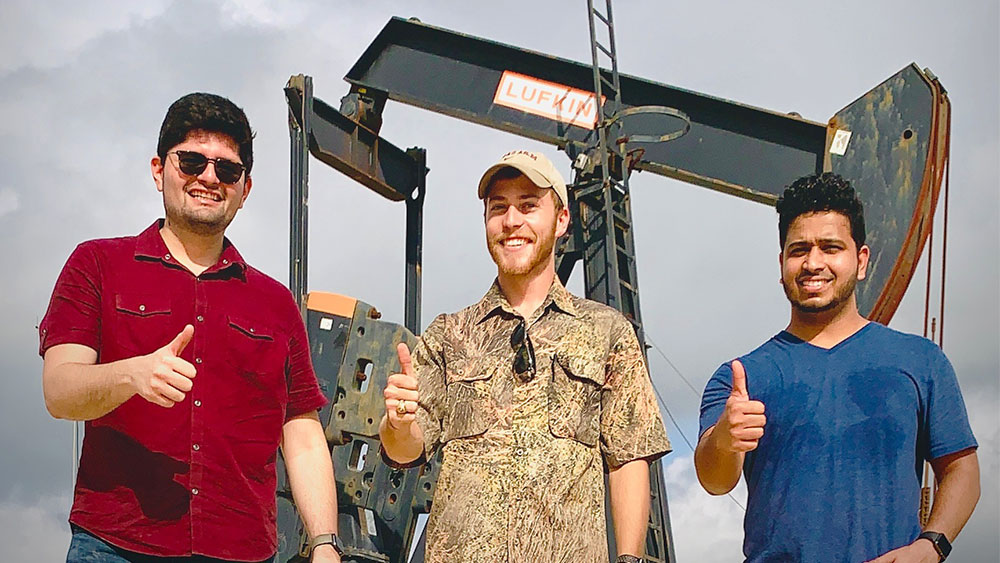
Set to help further accelerate the digital transformation of the energy industry, the Texas A&M University student-led company, Teale Engineering LLC, has been recently accepted into the national NSF i-CORPS Teams Program – a true testament of their abilities.
The NSF i-CORPS Site Program is one that provides students with the foundational elements to take an innovation and discover the market potential of the production while moving their ideas toward commercialization.
The company includes students Enrique Losoyam, pursuing his doctoral degree in interdisciplinary engineering, Narendra Vishnumolakala, pursuing his doctoral degree in interdisciplinary engineering, and Connor Ust, pursing his master’s degree in engineering technology. The team formed after discovering one another during the Aggies Invent – Energy Solutions competition in 2019, and have since founded their company after joining Texas A&M’s NSF i-CORPS Site Program together.
“Our team came together mostly by chance,” Losoya said. “Although we did not win that Aggies Invent competition, we realized that we worked well together and had skills that could complement one another’s and shortly after formed our company, Teale Engineering LLC.”
The company decided to focus on the energy sector as it faces a key challenge in meeting the growing demand for energy in a safe and environmentally responsible manner. Teale Engineering LLC strives to bridge this gap by leveraging advanced technologies and innovations.
Like many engineers, we tend to fall in love with an idea or whatever project we are working on and want to dig into the details and sometimes lose sight of our customers' needs.
Therefore, their immediate hope in this program was to interact with experts and customers in the industry to discover if the technology they are developing provides a solution to an actual problem faced in the energy sector today. The team has been working on the research topic for years within Texas A&M, and the idea was born after brainstorming ideas from different multidisciplinary perspectives and experiences.
They realized that, for decades, one of the industry's most critical technological limiters in drilling optimization for the oil industry is the inability to transmit large amounts of data from the downhole and processing it on the surface. Their solution eliminates the need to transfer large amounts of data altogether by performing most of the processing directly at the drill bit.
“In short, we're building the fastest, most powerful, and intelligent downhole tool ever created for the next generation of drilling technology that can identify, optimize and potentially control drilling operations,” Vishnumolakala said. “We applied the lean launch methodology to the customer discovery process to identify the target market, which helped us by opening up new market opportunities for the tool, such as the geothermal drilling industry.”
Brian Rogers, the company’s mentor through the NSF i-CORPS Site Program, was initially excited about the product because it was forward thinking. Rogers had just finished a rotation on a drilling rig and found that his direct experience provided unique insight to the possibilities that this product could bring.
“When Teale Engineering LLC approached me with assisting them on their product, it was clearly a next-generation product we could apply to the rig systems design basis,” Rogers said. “We finished our coaching session with a robust risk assessment, one that incorporated customer feedback and industry return on experience, subsequently leading to a prototype product development in the next NSF i-CORPS Site Program phase.”
It was through NSF i-CORPS Site Program mentor, Rodney Boehm, that the team found courage to apply for the national program, by providing a strong recommendation and believing in themselves and their product.
“One of the most important takeaways during the program was realizing how powerful the Aggie network is, but more importantly, how extremely helpful and altruistic people can be,” Losoya said. “We were shocked to find out how helpful and accessible people can be.”
The team has found that the program grew them both professionally and personally, providing an immersive experience that heightened their interpersonal, communication and professional business skills. Most importantly, Ust realized the value of industry feedback.
“It was difficult at first to have a project you care so much about be critiqued and criticized until I realized how to use the feedback to our advantage,” Ust said.
As the team continues to evolve their product with the national NSF i-CORPS Teams Program, the company hopes to prove that the product's technical and economic feasibility will benefit automating the drilling operations and open up avenues for implementing the technology in other aspects of process optimization.